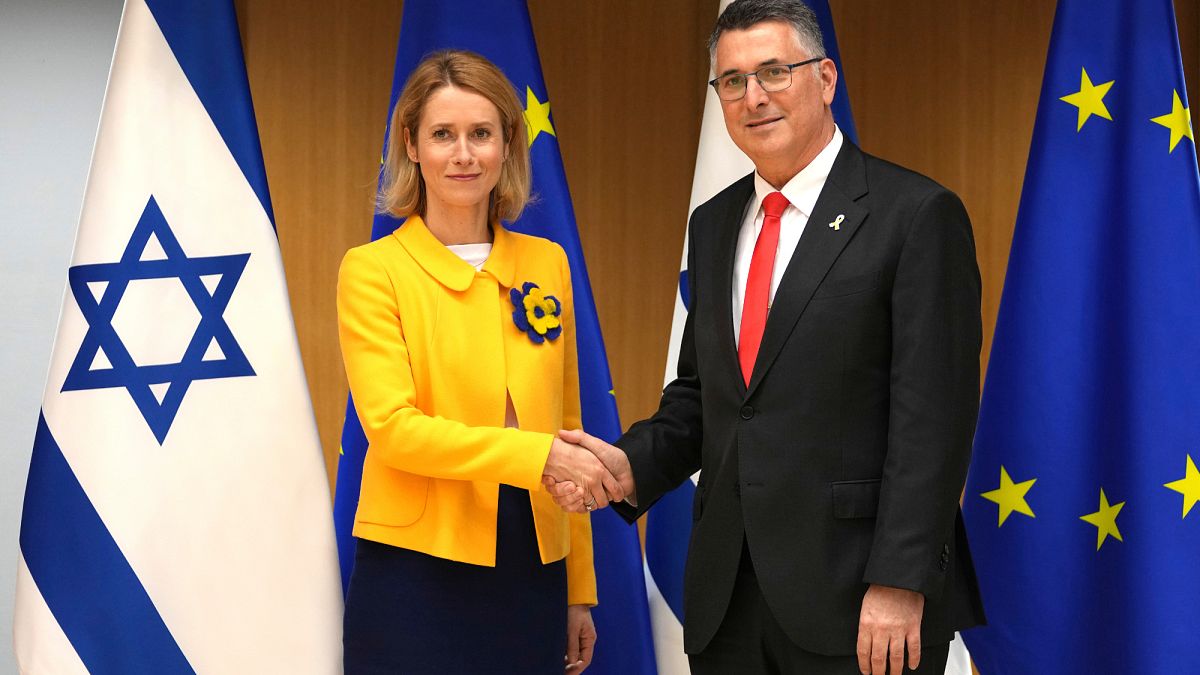By Maia de la Baume and Shona Murray
Published on
The EU’s top diplomat Kaja Kallas is set to offer an exhaustive list of 10 possibilities for the EU to respond to Israel’s action in Gaza during a meeting of the Foreign Affairs Council in Brussels this week, but EU diplomats told Euronews there’s little appetite across the EU to take any action against Tel Aviv.
Kallas’ 10 options include suspending visa free travel and blocking imports from the Jewish settlements in response to Israel’s breach of the EU-Israel Association Agreement, according to a document issued by Kallas’s office seen by Euronews.
The proposals, which are listed with their legal basis and the procedure required to adopt them, include suspending the entire EU-Israel Association Agreement, halting political dialogue with Israel, or barring Tel Aviv access to EU programs, all of which require unanimous support from the EU’s 27 member states.
But the document also lists other options including “suspension of trade preferences” with Israel and a halt of the EU-Israel Aviation agreement, which would require a qualified majority vote, meaning 55% of member states representing at least 65% of the total EU population.
The document is the result of Kallas’s efforts to follow up on a review of the human rights clause of the EU-Israel Association Agreement, which found that Israel is in breach of the agreement due to violations in Gaza and the West Bank.
Kallas was originally preparing to offer ministers with five options, but the EU’s top diplomat has decided to double down on the list and “include measures that member states can opt for unilaterally without needing a Commission proposal”, according to one EU diplomat.
Diplomats told Euronews that member states are unlikely to choose to back any of the options for action for a number of reasons.
First, some countries insist the EU should it should wait to see the result of an agreement brokered by Kallas last week attempting to imrpove the flow of aid to Gaza. The EU announced on Thursday that it had negotiated a “significant” improvement of humanitarian aid access into Gaza, including an increase of food trucks, and an agreement to “protect the lives of aid workers”.
A Kallas spokesperson told reporters on Friday that as a result of the agreement, Israel had opened the Zikim border crossing, allowed entry of fuel and repair water pipes, “together with the reopening of the Jordanian route”.
Countries waiting to see results of new humanitarian agreement
Secondly, the EU is still far too divided on the issue, and many countries – including the Czech Republic, Germany, Hungary and Italy – are unwilling to sanction Israel if the situation on the ground improves, opposing the idea of suspending the EU-Israel Association Agreement in part or full.
Ireland and Spain remain eager to take action against Israel, with the former already moving to vet imports from Israeli settlements in the West Bank, becoming the first EU country to do so.
For many diplomats, any further steps will depend on Israel’s implementation of the humanitarian agreement brokered last week.
“Kallas insisted to the Israelis that it cannot just be an agreement on paper it needs to be implemented on the ground,” one diplomat said. “It depends if Israel puts the Kallas plan into action on the ground,” said another EU diplomat.
“If we can see some results by Tuesday, I think that will be an important sign from the side of Israel that they have agreed to do this and are willing to implement it,” said a third.
Meanwhile Israeli airstrikes are ongoing as is the blockade, despite the announcement, the third diplomat pointed out.
The Israeli military launched its Gaza campaign in response to the Hamas attack on 7 October 2023, in which about 1,200 people were killed and 251 others were taken hostage.
At least 57,823 people have been killed in Gaza since then, according to the Hamas-run health ministry.

